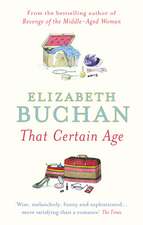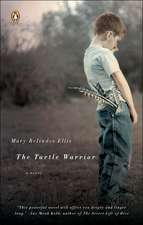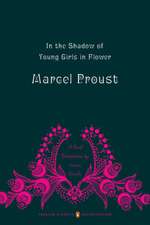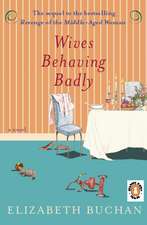The Good Wife Strikes Back
Autor Elizabeth Buchanen Limba Engleză Paperback – 30 noi 2004 – vârsta de la 18 ani
Elizabeth Buchan’s New York Times bestseller Revenge of the Middle-Aged Woman was hailed as “a thoughtful, intelligent, funny, coming-of-middle-age story” by The Boston Globe. Now she’s back with another wise and entertaining novel about a woman who veers off the beaten path—and finds much more than she bargained for. After nineteen years of being the perfect wife to an ambitious politician, Fanny Savage is restless. Tired of merely keeping quiet and looking good at public engagements, she remembers the career she abandoned and the life she left behind as a successful partner in her father’s Italian wine business. She has devoted two decades to being the Good Wife. Was it worth it after all? Could it be time for a trip back to Italy—to the pleasures of sun, wine, and food? Could it be time for . . . a change?
Preț: 121.00 lei
Nou
Puncte Express: 182
Preț estimativ în valută:
23.15€ • 24.22$ • 19.23£
23.15€ • 24.22$ • 19.23£
Carte tipărită la comandă
Livrare economică 02-16 aprilie
Preluare comenzi: 021 569.72.76
Specificații
ISBN-13: 9780143034490
ISBN-10: 0143034499
Pagini: 320
Dimensiuni: 129 x 196 x 15 mm
Greutate: 0.21 kg
Editura: Penguin Books
ISBN-10: 0143034499
Pagini: 320
Dimensiuni: 129 x 196 x 15 mm
Greutate: 0.21 kg
Editura: Penguin Books
Recenzii
"Visceral and on the mark... ladies, welcome your midlife crises with open arms." —USA Today
"Buchan’s vivid, witty style makes The Good Wife Strikes Back a breezy but deeply satisfying pleasure." —The Dallas Morning News
"Buchan’s vivid, witty style makes The Good Wife Strikes Back a breezy but deeply satisfying pleasure." —The Dallas Morning News
Notă biografică
Elizabeth Buchan is the author of several highly acclaimed and bestselling books of fiction, including the bestselling Revenge of the Middle-Aged Woman, The Good Wife Strikes Back, Everything She Thought She Wanted, and Consider the Lily.
Extras
Chapter 1
It is a truth universally acknowledged that one person’s happiness is frequently bought at the expense of another’s.
My husband Will, a politician to his little toe, did not entirely get the point. He maintained that sacrifices in the cause of the common good were sufficient in themselves to make anyone happy. And since Will had sacrificed a significant slice of his family life to pursue his ambitions as, first, a promising MP, then a member of the Treasury Select Committee, then minister, and— latterly—as one who was tipped to be a possible Chancellor of the Exchequer, it followed that he should have been supremely happy.
I think he was.
But was I?
Not a question, perhaps, that a good wife should ask.
On our nineteenth wedding anniversary, Will and I promised each other to be normal. To this end, Will carried me off to the theater, ordered champagne, kissed me lovingly and proposed the toast: “To married life.”
The play was Ibsen’s A Doll’s House, and the production had excited attention. Although I could see that he was aching with tiredness, Will sat very still and upright in the seat, not even relaxing when the lights went dim. An upright back was part of the training he had imposed on himself never to let down his guard in public. Although I am better than I used to be, I am still laggardly in that department. It is so tempting to slump, hitch up my skirt and laugh when my sense of the ridiculous is tickled—and there was much in our life that was ridiculous. Politicians, ambassadors, constituents, coffee mornings, chicken suppers, state occasions...a wonderful, colorful caboodle replete with the ambitious and the innocent, the failures and the successes.
Of necessity, Will laughed with circumspection—so much so that, once, I accused him of having lost the ability through lack of use. There was only a tiny hint of a smile on his lips when he explained to me that one small error of attention could undo years of work.
I sneaked a look at him from under eyelids that still stung from the morning’s regular date with the beauty salon. Dyed eyelashes were a necessity because, when I do laugh, my eyes water. In the early part of Will’s career, when I was being scrutinized and weighed and measured from head to foot by sharp eyes in the constituency, Mannochie, Will’s watchful and faithful political agent, had been forced to whisper discreetly, “Train tracks, Mrs. S,” which meant my mascara had smudged. There was no option but to laugh off that one and whisk myself to the nearest mirror for a quick repair job. This was part of the bargain struck between Will and me. In short, to look good as the minister’s wife was to be good.
Dressed in pale, shimmery blue, Nora made her entrance onto the stage and her husband asked anxiously, “What’s happened to my little songbird?”
Will reached over for my hand, the left one, which bore his wedding ring and the modest ruby we had chosen together. It was small because, newly engaged and glowing with love at the prospect of shared happiness and mutual harmony, I had not wished him to spend too much money on me. Hindsight is a great thing, and I have come to the conclusion that modesty is wasted when it comes to jewelry. The touch of his hand was unfamiliar, strange almost, but I had grown used to that, too, and it was not significant. Beneath the unfamiliarity, Will and I were connected by our years of marriage. That was indisputable.
At the end of the play, still in her pale blue, Nora declared, “I don’t believe in miracles any longer.” The sound of the front door opening and closing as she left the house was made to sound like a prison gate clanging shut.
Someone in the audience gave a little cheer. It echoed above the perfectly groomed heads in the stalls, and there was a rustle of collective embarrassment at this demonstration of female solidarity.
When Parliament sat, Will lived in London during the week, in a mansion block in Westminster and it was London where he did his deals in the Members’ tearoom, and struck alliances. In the old days, he came down to Stanwinton at weekends to nurse his constituency and his family, in that order, and I came up to London infrequently. Now that Chloe, our daughter, was eighteen, I was free to come up to London most weeks, but tonight we were driving home.
I watched the cold, eerie city lights give way to the shadows of the suburbs. At home, I often played the game of not-turning-on-the-light-until-the-very-last-minute. I loved that moment of transition between light and dark, and the textures of light and shade. I had learned that if I remained quite still something surprising might swim up out of the spaces in my head. Sometimes only a fleeting thought. Sometimes a revelation or a conclusion. Its chief element was of surprise and I found myself increasingly craving the delight of discovery. It was the moment to consider peace, happiness, expectation,...but, lately, I suppose, to reflect on a certain, creeping restlessness and a growing sense that it was time for a change.
Will cleared his throat—I recognized the signal—and began to talk about his project of the moment: the controversial European initiative to tax anyone with a second car. “There’s no question, but we have to do something before the world chokes. We can’t stand by and do nothing; we must show that we mean what we say.” He turned. “Fanny? Are you listening?”
“Of course,” I said. “Look at the road, Will, not at me.”
“Well?”
But I was thinking of the days when my energy had been devoted to Will’s political life and objectives and wondering why I did not feel the same. It was not as though we were old. I still loved Will, although sometimes ripples of irritation and exasperation made me forget I did—but that was marriage. Our life still held many possibilities.
“Fanny...? Do you agree with what I am doing?”
“I don’t think it stands much of a chance,” I replied. “I don’t think people always want to be told what is good for them.”
“So I’m on my own on this one?” he said with the tone of one well used to arguing a case. “Fair enough.”
An hour or so later, he nosed the car into the drive, unsnapped his seat belt and reached for the red box filled with papers, which required attention, that was never far from a minister’s side.
“I hope you enjoyed the evening.” He hefted the box onto his knee and added, “We’ve made it Fanny, haven’t we? Nineteen years...”
I felt a sudden, intense disquiet. Or was it bewilderment? Where had those years gone? One of the saints, I think it was Theresa, wrote that the soul has many rooms. So does a life, and a marriage. Motherhood, too, and I had been curious to shine a light into each one. But having struggled through the muffling intimacies of being a wife and a mother, I was now asking: Which room was mine alone? Into which still, private room could I retreat?
I smiled at him. “It was a lovely evening.” Then I leaned over and kissed him.
When we let ourselves into the house, I realized that I’d made the mistake, unlike Nora, of continuing to believe in miracles. The commotion that greeted us—Meg shouting and Sacha, her son, cajoling—meant only one thing. Will’s sister had been drinking.
“Why?” I murmured. “Why now? She’s been off it for months.”
Will’s face had tightened into the expression of frozen distress that I knew so well and dreaded. “I’ll deal,” I said. “You go and check on your papers. Otherwise you won’t get any sleep.” I pushed him gently in the direction of the study. “Go.”
I went down the passage that ran the width of the house and waited a moment or two at her door. The noises had stopped.
“Sacha?”
“Upstairs, Fanny.”
I found him in Meg’s bedroom, manhandling his mother’s inert body onto the bed, and hastened to help. Meg was hunched on her side. I smoothed her hair back from her forehead. She was as fair as I was dark, and much smaller boned. “Has she had a lot?”
Sacha arranged her legs into a more comfortable position. “I’m not quite sure.” He added with an effort, “Sorry.”
“It’s not your fault.” I bent down to retrieve a whiskey bottle from the floor. It was still three- quarters full. “I don’t think she’s had that much...”
“But enough.”
“She’s been brilliant lately, and didn’t touch a drop while you were away.” Sacha’s nu-metal band was struggling to get off the ground, and he was frequently away traveling the circuit.
He flinched and I could have kicked myself. “It isn’t you. It isn’t you coming back....It’s the time of year, or an unexpected bill or—”
“She rang my father today. He wants to renegotiate the alimony. That’s probably it.”
“Yes. That’s it.” Meg had never got over Rob walking out on her when Sacha was tiny. “Talking to your father is always tricky for her.”
“I know,” he said. He spoke far too wearily for a twenty-four-year-old. I slid my arms around my surrogate son. He smelled so clean. He always did, however many smoky, drink- filled places he’d worked in. “Don’t despair.”
“I don’t,” he lied.
“Shall I sit with her?”
Sacha propelled me toward the door. This was between him and his mother and, now that he was older, he tried to keep it that way—because it was so terrible and so intimate.
I turned to look at him. “It was only once, remember,” I said. “There’s been months and months of nothing.”
In Meg’s kitchen, her lost battle was marked out by a trail of half-empty coffee cups. The one by the phone was still full, and signaled the moment of defeat. “I hate you for knowing when to stop,” she had once told me.
I harvested the cups and washed them up, scrubbing angrily at their brown, scummy rims. Through the window, I watched a vixen slide along the darkened flower bed. She was thinner than a London fox. They say that foxes are safest in the city, but I wonder if they are plagued by a genetic memory of the past. Do they miss the smell of corn in high summer, the crispness of frosted grass?
I left the mugs to drain and found Chloe slumped at the kitchen table beside a glass of apple juice. I bent over and kissed her. She smelled of shampoo and her soft cheeks were slippery with face cream.
She rubbed her eyes. “Couldn’t really sleep,” she said. “Is Aunt Meg OK?”
I trod warily. Will and I had been clever enough to hide the worst of Meg’s excesses from our daughter. Chloe was still too young to be told the absolute truth, but too old to be lied to. “Fine.”
She looked anxious and a little bewildered. With her fair hair and dark eyes, she was a smaller, infinitely more delicate version of Will. One day she would be beautiful and that promise gave me deep, unqualified pleasure. “Did you and Dad enjoy the play?”
“It was brilliant; we had a lovely evening.”
She polished off the apple juice. “It’s nice that you two went out together.”
“Did you do all your homework?”
She shrugged irritably. “Brigitte stood guard and I told her to get lost... but I did it.”
Brigitte was our temporary au pair-cum-housekeeper, who took her duties very seriously.
“Tea?”
She shook her head.
“Bed, then.” I pulled her to her feet, hustled her upstairs and settled her. I hunkered down beside her and whispered, “Everything’s fine.”
Chloe closed her eyes. “Do I really have to go to Pearl Veriker’s funeral tomorrow?”
“Dad says we must. No argument.”
“It’s not fair,” Chloe hissed. “Just because you have to do all these ghastly things, you make me as well.”
“Go to sleep.”
I hovered for a minute or two outside her room. Poor Chloe. She would learn that every shared life, every separate life, has bloodstained patches and tattered remnants of compromise. Sometimes, too, the dull ache of small martyrdom.
Will was already in bed and I slid in beside him. “Chloe woke up. I’ve tucked her back in.”
“Good.” He hesitated. “Is she... is Meg all right?”
“Sleeping.”
“What triggered her off do you think?”
I thought about it. “She and Rob talked on the phone about money, but I suspect that it had something to do with our anniversary.”
Our conversation went round and round on the subject of Meg. As it always did. Will scratched his head. “I would give much to think that Meg was happy and sorted out.” He turned to me. “She has a lot to thank you for, Fanny. So do I.”
My feelings for Meg could be ambivalent, but being thanked by Will was sweet.
He stirred restlessly. “What do you think is best, Fanny?” he said. “Do you think we should arrange more help for her? Could you manage to do that?”
“I could, but it might be better if you could talk to her. Maybe she needs a bit of your attention.”
He thought about this. “I haven’t got the time at the moment. But I will when I can. I promise.”
I used to dream of a big, generous, blowsy household where children rustled and murmured in the bedrooms—two, three, even four of them. And every night, I would do the rounds. “This is Millie,” I would say, smoothing fair tangles away from her face. “This is Arthur,” removing the thumb from his mouth. “And this...this one is Jamie, the terror.”
But it had not happened that way. After Chloe there were no more babies. My body pulled and strained to obey my longings, but it could not do what I asked of it. Sometimes they haunt me, my nonchildren—those warm, sleeping, rosy bodies, the children-who-never- were—and I listen out for them playing under the eaves.
“I don’t mind,” Will said to me once. “We have Chloe, that’s enough. We look after her. I look after you. You look after me, Fanny. Be content, please.”
“Don’t you mind at all?” I asked.
He touched my cheek. “I mind for you. I mind anything that hurts you.”
Yet, as it turned out, my household was full, and we had been happy. First Chloe was born, and I was catapulted into the terror and mystery and exultation of a love that would never die. Then Meg came to live with us; Sacha too, after his sixteenth birthday. The au pairs came and went; the party workers slipped in and out, each leaving a ghostly imprint on the atmosphere, their rustles and murmurs dissolving into the general murmur of life.
It is a truth universally acknowledged that one person’s happiness is frequently bought at the expense of another’s.
My husband Will, a politician to his little toe, did not entirely get the point. He maintained that sacrifices in the cause of the common good were sufficient in themselves to make anyone happy. And since Will had sacrificed a significant slice of his family life to pursue his ambitions as, first, a promising MP, then a member of the Treasury Select Committee, then minister, and— latterly—as one who was tipped to be a possible Chancellor of the Exchequer, it followed that he should have been supremely happy.
I think he was.
But was I?
Not a question, perhaps, that a good wife should ask.
On our nineteenth wedding anniversary, Will and I promised each other to be normal. To this end, Will carried me off to the theater, ordered champagne, kissed me lovingly and proposed the toast: “To married life.”
The play was Ibsen’s A Doll’s House, and the production had excited attention. Although I could see that he was aching with tiredness, Will sat very still and upright in the seat, not even relaxing when the lights went dim. An upright back was part of the training he had imposed on himself never to let down his guard in public. Although I am better than I used to be, I am still laggardly in that department. It is so tempting to slump, hitch up my skirt and laugh when my sense of the ridiculous is tickled—and there was much in our life that was ridiculous. Politicians, ambassadors, constituents, coffee mornings, chicken suppers, state occasions...a wonderful, colorful caboodle replete with the ambitious and the innocent, the failures and the successes.
Of necessity, Will laughed with circumspection—so much so that, once, I accused him of having lost the ability through lack of use. There was only a tiny hint of a smile on his lips when he explained to me that one small error of attention could undo years of work.
I sneaked a look at him from under eyelids that still stung from the morning’s regular date with the beauty salon. Dyed eyelashes were a necessity because, when I do laugh, my eyes water. In the early part of Will’s career, when I was being scrutinized and weighed and measured from head to foot by sharp eyes in the constituency, Mannochie, Will’s watchful and faithful political agent, had been forced to whisper discreetly, “Train tracks, Mrs. S,” which meant my mascara had smudged. There was no option but to laugh off that one and whisk myself to the nearest mirror for a quick repair job. This was part of the bargain struck between Will and me. In short, to look good as the minister’s wife was to be good.
Dressed in pale, shimmery blue, Nora made her entrance onto the stage and her husband asked anxiously, “What’s happened to my little songbird?”
Will reached over for my hand, the left one, which bore his wedding ring and the modest ruby we had chosen together. It was small because, newly engaged and glowing with love at the prospect of shared happiness and mutual harmony, I had not wished him to spend too much money on me. Hindsight is a great thing, and I have come to the conclusion that modesty is wasted when it comes to jewelry. The touch of his hand was unfamiliar, strange almost, but I had grown used to that, too, and it was not significant. Beneath the unfamiliarity, Will and I were connected by our years of marriage. That was indisputable.
At the end of the play, still in her pale blue, Nora declared, “I don’t believe in miracles any longer.” The sound of the front door opening and closing as she left the house was made to sound like a prison gate clanging shut.
Someone in the audience gave a little cheer. It echoed above the perfectly groomed heads in the stalls, and there was a rustle of collective embarrassment at this demonstration of female solidarity.
When Parliament sat, Will lived in London during the week, in a mansion block in Westminster and it was London where he did his deals in the Members’ tearoom, and struck alliances. In the old days, he came down to Stanwinton at weekends to nurse his constituency and his family, in that order, and I came up to London infrequently. Now that Chloe, our daughter, was eighteen, I was free to come up to London most weeks, but tonight we were driving home.
I watched the cold, eerie city lights give way to the shadows of the suburbs. At home, I often played the game of not-turning-on-the-light-until-the-very-last-minute. I loved that moment of transition between light and dark, and the textures of light and shade. I had learned that if I remained quite still something surprising might swim up out of the spaces in my head. Sometimes only a fleeting thought. Sometimes a revelation or a conclusion. Its chief element was of surprise and I found myself increasingly craving the delight of discovery. It was the moment to consider peace, happiness, expectation,...but, lately, I suppose, to reflect on a certain, creeping restlessness and a growing sense that it was time for a change.
Will cleared his throat—I recognized the signal—and began to talk about his project of the moment: the controversial European initiative to tax anyone with a second car. “There’s no question, but we have to do something before the world chokes. We can’t stand by and do nothing; we must show that we mean what we say.” He turned. “Fanny? Are you listening?”
“Of course,” I said. “Look at the road, Will, not at me.”
“Well?”
But I was thinking of the days when my energy had been devoted to Will’s political life and objectives and wondering why I did not feel the same. It was not as though we were old. I still loved Will, although sometimes ripples of irritation and exasperation made me forget I did—but that was marriage. Our life still held many possibilities.
“Fanny...? Do you agree with what I am doing?”
“I don’t think it stands much of a chance,” I replied. “I don’t think people always want to be told what is good for them.”
“So I’m on my own on this one?” he said with the tone of one well used to arguing a case. “Fair enough.”
An hour or so later, he nosed the car into the drive, unsnapped his seat belt and reached for the red box filled with papers, which required attention, that was never far from a minister’s side.
“I hope you enjoyed the evening.” He hefted the box onto his knee and added, “We’ve made it Fanny, haven’t we? Nineteen years...”
I felt a sudden, intense disquiet. Or was it bewilderment? Where had those years gone? One of the saints, I think it was Theresa, wrote that the soul has many rooms. So does a life, and a marriage. Motherhood, too, and I had been curious to shine a light into each one. But having struggled through the muffling intimacies of being a wife and a mother, I was now asking: Which room was mine alone? Into which still, private room could I retreat?
I smiled at him. “It was a lovely evening.” Then I leaned over and kissed him.
When we let ourselves into the house, I realized that I’d made the mistake, unlike Nora, of continuing to believe in miracles. The commotion that greeted us—Meg shouting and Sacha, her son, cajoling—meant only one thing. Will’s sister had been drinking.
“Why?” I murmured. “Why now? She’s been off it for months.”
Will’s face had tightened into the expression of frozen distress that I knew so well and dreaded. “I’ll deal,” I said. “You go and check on your papers. Otherwise you won’t get any sleep.” I pushed him gently in the direction of the study. “Go.”
I went down the passage that ran the width of the house and waited a moment or two at her door. The noises had stopped.
“Sacha?”
“Upstairs, Fanny.”
I found him in Meg’s bedroom, manhandling his mother’s inert body onto the bed, and hastened to help. Meg was hunched on her side. I smoothed her hair back from her forehead. She was as fair as I was dark, and much smaller boned. “Has she had a lot?”
Sacha arranged her legs into a more comfortable position. “I’m not quite sure.” He added with an effort, “Sorry.”
“It’s not your fault.” I bent down to retrieve a whiskey bottle from the floor. It was still three- quarters full. “I don’t think she’s had that much...”
“But enough.”
“She’s been brilliant lately, and didn’t touch a drop while you were away.” Sacha’s nu-metal band was struggling to get off the ground, and he was frequently away traveling the circuit.
He flinched and I could have kicked myself. “It isn’t you. It isn’t you coming back....It’s the time of year, or an unexpected bill or—”
“She rang my father today. He wants to renegotiate the alimony. That’s probably it.”
“Yes. That’s it.” Meg had never got over Rob walking out on her when Sacha was tiny. “Talking to your father is always tricky for her.”
“I know,” he said. He spoke far too wearily for a twenty-four-year-old. I slid my arms around my surrogate son. He smelled so clean. He always did, however many smoky, drink- filled places he’d worked in. “Don’t despair.”
“I don’t,” he lied.
“Shall I sit with her?”
Sacha propelled me toward the door. This was between him and his mother and, now that he was older, he tried to keep it that way—because it was so terrible and so intimate.
I turned to look at him. “It was only once, remember,” I said. “There’s been months and months of nothing.”
In Meg’s kitchen, her lost battle was marked out by a trail of half-empty coffee cups. The one by the phone was still full, and signaled the moment of defeat. “I hate you for knowing when to stop,” she had once told me.
I harvested the cups and washed them up, scrubbing angrily at their brown, scummy rims. Through the window, I watched a vixen slide along the darkened flower bed. She was thinner than a London fox. They say that foxes are safest in the city, but I wonder if they are plagued by a genetic memory of the past. Do they miss the smell of corn in high summer, the crispness of frosted grass?
I left the mugs to drain and found Chloe slumped at the kitchen table beside a glass of apple juice. I bent over and kissed her. She smelled of shampoo and her soft cheeks were slippery with face cream.
She rubbed her eyes. “Couldn’t really sleep,” she said. “Is Aunt Meg OK?”
I trod warily. Will and I had been clever enough to hide the worst of Meg’s excesses from our daughter. Chloe was still too young to be told the absolute truth, but too old to be lied to. “Fine.”
She looked anxious and a little bewildered. With her fair hair and dark eyes, she was a smaller, infinitely more delicate version of Will. One day she would be beautiful and that promise gave me deep, unqualified pleasure. “Did you and Dad enjoy the play?”
“It was brilliant; we had a lovely evening.”
She polished off the apple juice. “It’s nice that you two went out together.”
“Did you do all your homework?”
She shrugged irritably. “Brigitte stood guard and I told her to get lost... but I did it.”
Brigitte was our temporary au pair-cum-housekeeper, who took her duties very seriously.
“Tea?”
She shook her head.
“Bed, then.” I pulled her to her feet, hustled her upstairs and settled her. I hunkered down beside her and whispered, “Everything’s fine.”
Chloe closed her eyes. “Do I really have to go to Pearl Veriker’s funeral tomorrow?”
“Dad says we must. No argument.”
“It’s not fair,” Chloe hissed. “Just because you have to do all these ghastly things, you make me as well.”
“Go to sleep.”
I hovered for a minute or two outside her room. Poor Chloe. She would learn that every shared life, every separate life, has bloodstained patches and tattered remnants of compromise. Sometimes, too, the dull ache of small martyrdom.
Will was already in bed and I slid in beside him. “Chloe woke up. I’ve tucked her back in.”
“Good.” He hesitated. “Is she... is Meg all right?”
“Sleeping.”
“What triggered her off do you think?”
I thought about it. “She and Rob talked on the phone about money, but I suspect that it had something to do with our anniversary.”
Our conversation went round and round on the subject of Meg. As it always did. Will scratched his head. “I would give much to think that Meg was happy and sorted out.” He turned to me. “She has a lot to thank you for, Fanny. So do I.”
My feelings for Meg could be ambivalent, but being thanked by Will was sweet.
He stirred restlessly. “What do you think is best, Fanny?” he said. “Do you think we should arrange more help for her? Could you manage to do that?”
“I could, but it might be better if you could talk to her. Maybe she needs a bit of your attention.”
He thought about this. “I haven’t got the time at the moment. But I will when I can. I promise.”
I used to dream of a big, generous, blowsy household where children rustled and murmured in the bedrooms—two, three, even four of them. And every night, I would do the rounds. “This is Millie,” I would say, smoothing fair tangles away from her face. “This is Arthur,” removing the thumb from his mouth. “And this...this one is Jamie, the terror.”
But it had not happened that way. After Chloe there were no more babies. My body pulled and strained to obey my longings, but it could not do what I asked of it. Sometimes they haunt me, my nonchildren—those warm, sleeping, rosy bodies, the children-who-never- were—and I listen out for them playing under the eaves.
“I don’t mind,” Will said to me once. “We have Chloe, that’s enough. We look after her. I look after you. You look after me, Fanny. Be content, please.”
“Don’t you mind at all?” I asked.
He touched my cheek. “I mind for you. I mind anything that hurts you.”
Yet, as it turned out, my household was full, and we had been happy. First Chloe was born, and I was catapulted into the terror and mystery and exultation of a love that would never die. Then Meg came to live with us; Sacha too, after his sixteenth birthday. The au pairs came and went; the party workers slipped in and out, each leaving a ghostly imprint on the atmosphere, their rustles and murmurs dissolving into the general murmur of life.
Descriere
Now in paperback, this "guiltfree bonbon" ("The Dallas Morning News") is written by the bestselling author of "Revenge of the Middle-Aged Woman"). This wise and entertaining novel is about a woman who veers off the beaten path and finds much more than she bargained for.














